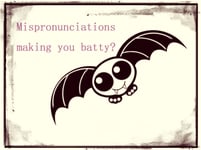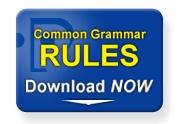 When I was a teenager (in the Dark Ages), my younger sister was reading a book passage aloud to our mom and me. She came to a word she didn’t recognize, paused, then came out with “muh-LANK-o-lee filled her days.” Mom immediately burst into laughter while I was still trying to figure out what my sister was saying. The word was melancholy — not an easy one for a 12-year-old, even a well-read one, to figure out.
When I was a teenager (in the Dark Ages), my younger sister was reading a book passage aloud to our mom and me. She came to a word she didn’t recognize, paused, then came out with “muh-LANK-o-lee filled her days.” Mom immediately burst into laughter while I was still trying to figure out what my sister was saying. The word was melancholy — not an easy one for a 12-year-old, even a well-read one, to figure out.
I see the same thing happen with my 14-year-old son when he pronounces words as he sees them, like sal-mon, or makes sense of them based on other words he knows, like saying pro-nown-cee-ay-shun because it’s similar to pronounce. But this tendency isn’t limited to young people. Most of us have had at least a few “so THAT’S how you say it” moments in our adult lives.
Mispronouncing the occasional word doesn’t mean we’re not smart, but sometimes that’s the impression it can give. And that’s the last thing you want to convey in your business dealings. With that in mind, we’ve assembled a list of commonly mispronounced words that businesspeople and professionals might encounter, along with their correct pronunciation in U.S. English. We’ve tried to note where regional variations may exist. Let us know in the comments if we’ve overlooked any.
Comptroller — This word is pronounced like and has the same meaning as controller. Comptrol any inclinations you might have to pronounce it as COMP-troller.
Data — The correct pronunciation in U.S. (and British) English is DAY-ta, not DAT-ta (Australians apparently prefer the latter pronunciation).
Liable — Many people drop the a when pronouncing this word, so it sounds like LYE-bull, or libel, which is another term with an altogether different meaning. Liable, pronounced LYE-a-bull, means legally responsible; libel is written defamation. If you commit libel, you may be liable for damages.
Often — This word is often pronounced as OFF-ten. The correct pronunciation in U.S. English is OFF-en … like soften. You wouldn’t say sof-ten, right? (Britons, however, retain the t in pronouncing the word as OFF-ten.)
Prerogative — Many mispronounce this word as per-AHG-a-tiv. Remembering that it means a privilege or preference, both of which begin with the same two letters as this word, may help you keep the p and r together in correctly pronouncing this word as pruh-RAHG-a-tiv.
Prestigious — Because this word is based on prestige, the inclination here is to say pres-TEE-jus. But the correct pronunciation is pres-TIJ-us.
Primer — Everything about this word screams PRY-mer to many native U.S. English speakers. But when used to mean a short informative piece of writing, it retains its British pronunciation: PRIH-mer (rhymes with simmer).
Probably — This word is commonly mispronounced as PRAH-blee or even PROL-ly in more casual conversation. Dropping a syllable is easy to do when two adjacent syllables (here, ob and ab) sound alike. But the correct pronunciation is PRAH-bub-lee. Slow down a bit, bub, and you’ll probably get it right.
Remuneration — Perhaps because this word refers to what someone is paid for their work (i.e., a dollar amount), the tendency is to say re-noom-er-A-shun (because it sounds like numeral). But the correct pronunciation is re-myune-er-A-shun.
Respite — If you find yourself overwhelmed with work, you no doubt need a respite, pronounced REH-spit. It’s not RE-spite; in other words, it doesn’t rhyme with despite, despite what you may have been told.
What words have you mispronounced repeatedly until learning the correct way to say them, or what words do you hear others commonly mispronounce? Let us know in the comments below.




